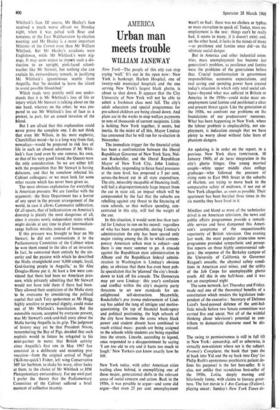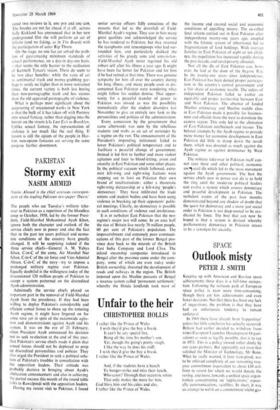Urban man meets trouble
AMERICA WILLIAM JANEWAY
New York—The people of this city can stop crying 'wolf.' It's out in the open now : New York is bankrupt. Harlem Hospital, one of twenty-odd municipal hospitals and the one serving New York's largest black ghetto, is about to shut down. It appears that the City University of New York will not be able to admit a freshman class next fall. The city's adult education and special programmes for pre-school children are being closed down. And plans are in the works to stop welfare payments to tens of thousands of current recipients. Little is holding New York together, it seems, but inertia. In the midst of all this, Mayor Lindsay has announed that he will run for re-election in November.
The immediate trigger for the financial crisis has been a confrontation between the liberal Republican Governor of New York State, Nel- son Rockefeller, and the liberal Republican Mayor of New York City, John Lindsay. Rockefeller, responding to fierce fiscal pressures at the state level, has proposed a 5 per cent, across-the-board cut in all state expenditure. The city, miserably incapable of financing itself, will feel a disproportionately large impact from the cut in state aid, an impact which will be compounded by the fact that the suburbs are rebelling against any threat to the financing of state schools, so that welfare spending, con- centrated in this city, will feel the weight of the axe.
In this situation, it would seem less than tact- ful for Lindsay to run on his record: regardless of who has been responsible, during Lindsay's administration the city has been spared only major rioting among the ills to which contem- porary American urban man is subject—and there is one more summer to go. A crusade against the Republican state administration in Albany and the Republican federal admini- stration in Washington is Lindsay's obvious ploy, so obvious that there has even been pub- lic speculation that he 'planned' the city's break- down to kick off his crusade. The Democrats may yet save Lindsay : this year's confusion and conflict within the city's majority party threatens to set new standards for un- enlightened self-destruction. Meanwhile, Rockefeller's pro forma endorsement of Lind- say has added the tang of intrigue and motive- questioning. On top of financial bankruptcy and political positioning, the high schools of the city have become the arena where black power and student dissent have combined to reach critical mass: guards are being assigned
to the schools while students are being expelled into the streets. Lincoln, according to legend,
once responded to a disappointment by saying 'I am too old to cry and it hurts too much to laugh.' New Yorkers can know exactly how he felt.
New York today, with other American cities trailing close behind, is exemplifying one of those major, generational shifts in the relevant areas of social concern and action. Back in the 1930s, it was possible to argue—and some did argue—that even 25 per cent unemployment wasn't so bad: there was no cholera or typhus or mass starvation to speak of. Today, mass un- employment is the test: things can't be really bad, it seems to many, if it doesn't exist; and, on the other hand, it lurks in the minds of many —as pestilence and famine once did—as the ultimate social danger.
But in America and other industrial coun- tries, mass unemployment has become last generation's problem, as pestilence and famine were the problems of the generations before that. Crucial transformation in government responsibilities, economic expectations, and real saving and spending power have created today's situation in which only total social col- lapse—beyond what was suffered in Britain or America in the 1930s—could make mass un- employment (and famine and pestilence) a clear and present threat again. Like the generation of the 1930s, we confront our problems on the foundations of our predecessors' successes. What has been happening in New York, where the labour problem is employability, not em- ployment, is indication enough that we have plenty to worry about without false fears of phantom dangers.
An updating is in order on the report, in a previous New York diary (SPECTATOR, 10 January 1969), of de facto integration in the city's ghetto fringes. One young married couple—white upper middle class college graduates—who followed the pressure of rising rents to East 99th Street in the suburbs of Harlem, are trying to move back to the comparative safety of midtown, if not out of New York altogether. as soon as possible. Their apartment has been burgled three times in the six months they have lived in it.
Mindless and bland as most of the technicolor drivel is on American television, the news and public affairs programmes provide a remark- able service and have dampened this Ameri- can's acceptance of the unquestionable superiority of British television. One evening last week, the most popular prime-time news programme provided sympathetic and percep- tive reports on three highly controversial sub- jects: the response of the Berkeley campus-of the University of California to Governor Reagan's assaults, the abysmal safety condi- tions in American coal mines, and the utility of the Job Corps for unemployable ghetto youth. All this in one half-hour, and it was not an exceptional night.
The same network, last Thursday and Friday, made real one of the theoretical benefits of a constitution which renders the legislature inde- pendent of the executive: Secretary of Defence Laird's hard-pressed defence of the anti-bal- listic missile before two Senate committees was carried live and uncut. Not all of the wishful thinking about television's potential to con- tribute to democratic discourse need be dis- missed.
The swing to permissiveness is still in full tilt in New York : censorship, self or otherwise, is virtually non-existent where sex is the subject. Portnoy's Complaint, the book that 'puts the id back into Yid and the oy back into Goy' (as Philip Roth's eponymous psychiatric patient de- fines his purpose) is the hot best-seller. It is also, not unlike that scandalous best-seller of the 1950s, Lolita, deeply moving and hilariously funny, with claims to literary great- ness. The hot movie is I Am Curious (Yellow), playing uncut: Sunday's New York Times de- voted two reviews to it, one pro and one con. The Swedes are not far ahead, if at all: actress Sally Kirkland has announced that in her new underground film she will perform an act of fellatio (and no faking, as in The Beard) with the participation of actor Rip Thorn.
On the stage, no one has yet solved the prob- lem of guaranteeing minimum standards of sexual performance, on a day-in day-out basis. —that seems the only barrier to the realisation of Kenneth Tynan's vision. There do seem to be two clear benefits:. while the ratio of art to sentimental trash and money-grubbing gar- bage is surely no higher than in more restrained times, the current variety is both less boring than non-pornographic trash and less vicious than the old approved pornography of violence.
What is perhaps most significant about the outpouring of uncensored works in New York is that the bulk of it has taken off with Portnoy into sexual fantasy, rather than digging into the horror on the streets a la Last Exit to Brooklyn. Unlike sexual fantasy, the representation of violence is too much like the real thing. If heroin is still the opium of the people in Har- lem, non-opium fantasies are serving the same purpose further downtown.



































 Previous page
Previous page